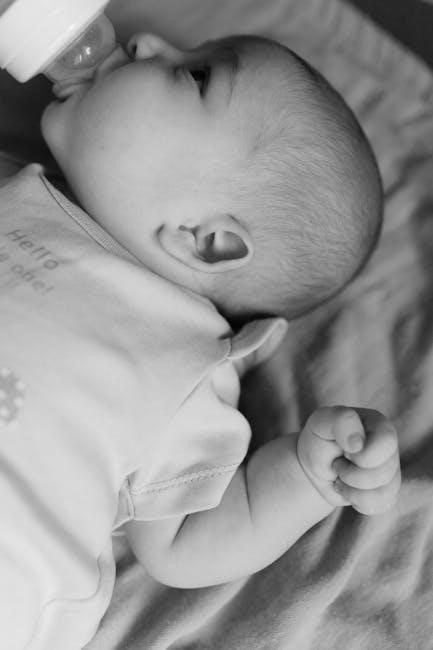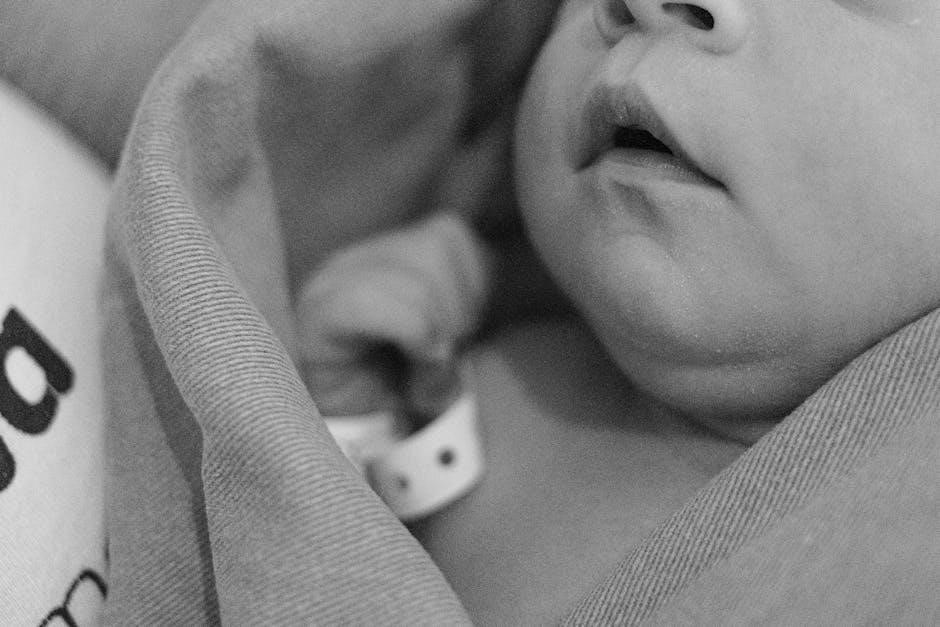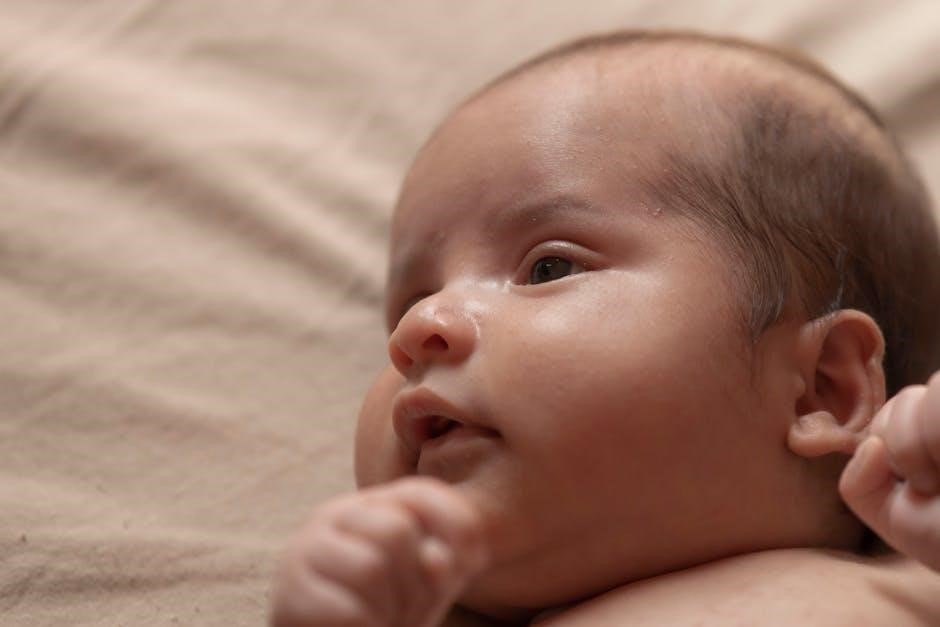pediatric sleep questionnaire pdf
The BEARS Sleep Questionnaire is a practical tool designed to assess sleep problems in children aged 2-18 years. It evaluates five key domains: bedtime issues, excessive daytime sleepiness, night awakenings, sleep regularity, and snoring or breathing difficulties. Early identification of sleep disorders is crucial for promoting healthy development and addressing potential risks to cognitive, emotional, and physical well-being. This questionnaire provides a user-friendly approach for healthcare providers to guide clinical interviews and ensure comprehensive sleep assessments in pediatric care settings.

Overview of Pediatric Sleep Questionnaires
Pediatric sleep questionnaires are essential tools for identifying and assessing sleep-related issues in children; These instruments are designed to evaluate various aspects of sleep health, including bedtime struggles, nighttime awakenings, excessive daytime sleepiness, sleep regularity, and breathing difficulties during sleep. They are widely used by healthcare providers to detect potential sleep disorders that may impact a child’s cognitive, emotional, and physical development. Sleep questionnaires are typically structured to include age-appropriate questions, ensuring relevance across different developmental stages, from toddlers to adolescents. Many of these tools, such as the BEARS Sleep Questionnaire, are concise and user-friendly, making them practical for use in clinical settings. By addressing key sleep domains, pediatric sleep questionnaires provide valuable insights for early intervention and treatment. Regular use of these tools in primary care can help improve sleep outcomes and overall quality of life for children. Their effectiveness lies in their ability to prompt further investigation when sleep problems are suspected, ensuring timely and appropriate care.
What is the BEARS Sleep Questionnaire?
The BEARS Sleep Questionnaire is a widely recognized screening tool designed to identify sleep problems in children aged 2 to 18 years. It is structured around the acronym BEARS, which stands for five key sleep domains: Bedtime Issues, Excessive Daytime Sleepiness, Awakenings at Night, Regularity and Duration of Sleep, and Snoring or Sleep-Related Breathing Disorders. Each domain includes age-appropriate questions tailored for different developmental stages, ensuring relevance and accuracy. The questionnaire is user-friendly and concise, making it an effective tool for healthcare providers in primary care settings. It is often used during clinical interviews to assess potential sleep disorders and guide further evaluation or intervention. The BEARS Sleep Questionnaire is particularly valued for its comprehensive yet practical approach, enabling early detection of sleep issues that may impact a child’s health and well-being. Its simplicity and effectiveness have made it a popular choice among pediatricians and researchers alike, contributing significantly to the field of pediatric sleep medicine. The tool is freely available and has been validated through various studies, demonstrating its reliability in identifying sleep-related concerns in children. By addressing these five critical areas, the BEARS Sleep Questionnaire provides a thorough yet efficient method for evaluating pediatric sleep health.

Purpose of the BEARS Sleep Questionnaire
The primary purpose of the BEARS Sleep Questionnaire is to serve as a screening tool for identifying sleep-related issues in children aged 2 to 18 years. It is designed to help healthcare providers detect common sleep disorders early, ensuring timely intervention and improving outcomes. The questionnaire focuses on five key domains—bedtime issues, excessive daytime sleepiness, night awakenings, sleep regularity, and snoring or breathing difficulties—making it a comprehensive yet concise tool for assessing pediatric sleep health. By identifying potential sleep problems, the BEARS Sleep Questionnaire enables healthcare providers to address concerns that may impact a child’s cognitive, emotional, and physical development. Its user-friendly format makes it ideal for use in primary care settings, where it can guide clinical interviews and facilitate further evaluation or treatment. The tool is particularly valuable for promoting healthy sleep habits and ensuring that children receive appropriate care for sleep-related challenges. Its widespread use has made it a cornerstone in pediatric sleep medicine, aiding in the early detection and management of sleep disorders. The BEARS Sleep Questionnaire is a cost-effective and practical solution for improving sleep health in children.

Structure and Components of the BEARS Sleep Questionnaire
The BEARS Sleep Questionnaire is structured around five key domains, represented by the acronym BEARS: Bedtime Issues, Excessive Daytime Sleepiness, Night Awakenings, Sleep Regularity, and Snoring. Each domain is designed to assess specific aspects of a child’s sleep patterns and potential sleep disorders. The questionnaire is divided into age-appropriate sections for toddlers/preschoolers (2-5 years), school-aged children (6-12 years), and adolescents (13-18 years), ensuring relevance across different developmental stages. Within each domain, trigger questions are provided to guide clinical interviews and identify red flags for sleep problems. For example, bedtime issues may include questions about difficulty falling asleep or resistance to bedtime routines. The tool also evaluates sleep regularity and duration, which are critical for diagnosing issues like insomnia or sleep deprivation. The structured format makes it easy for healthcare providers to systematically assess sleep health and identify areas that may require further evaluation or intervention. This comprehensive yet concise approach ensures that the BEARS Sleep Questionnaire is both effective and practical for use in pediatric care settings. Its design supports early detection and management of sleep-related challenges, making it a valuable resource for promoting healthy sleep in children.

Applications and Uses in Clinical Settings
The BEARS Sleep Questionnaire is widely utilized in clinical settings as a practical tool for identifying sleep-related issues in children. It is commonly implemented in pediatric clinics, primary care offices, and ambulatory settings to screen for sleep disorders during routine well-child visits or when parents raise concerns about their child’s sleep. The tool’s brevity and ease of use make it an efficient option for busy clinical environments, allowing healthcare providers to quickly assess sleep health without requiring extensive time or resources. Additionally, the BEARS Sleep Questionnaire is often used in conjunction with clinical interviews to guide further evaluations or referrals to sleep specialists when necessary. Its application extends to diagnosing conditions such as sleep apnea, insomnia, and excessive daytime sleepiness, while also aiding in the management of bedtime routines and sleep-related behavioral challenges. The tool’s versatility and focus on age-appropriate domains ensure its effectiveness in addressing sleep problems across a wide range of pediatric populations. By incorporating the BEARS Sleep Questionnaire into clinical practice, healthcare providers can improve early detection and management of sleep disorders, ultimately enhancing children’s overall health and well-being.
Bedtime Issues: Assessment and Implications
Bedtime issues are a common concern in pediatric sleep medicine, and the BEARS Sleep Questionnaire provides a structured approach to assess these problems. The tool includes specific questions to evaluate difficulties related to bedtime, such as trouble falling asleep, resistance to going to bed, and challenges in maintaining a consistent sleep schedule. These issues can significantly impact a child’s mood, behavior, and cognitive development, making early identification crucial. The questionnaire helps healthcare providers understand the root causes of bedtime struggles, such as environmental factors or behavioral habits, and guides appropriate interventions; Addressing bedtime problems is essential to ensure adequate sleep duration and quality, which are critical for physical and mental health. By identifying these issues early, parents and clinicians can implement strategies like establishing consistent routines or creating a calming sleep environment. This proactive approach can prevent long-term consequences and promote healthier sleep patterns, ultimately enhancing the child’s overall well-being and quality of life.
Excessive Daytime Sleepiness: Detection and Impact
Excessive daytime sleepiness (EDS) in children is a significant concern, as it can interfere with daily functioning, cognitive development, and overall well-being. The BEARS Sleep Questionnaire includes specific questions to detect EDS, such as whether the child feels sleepy during the day, falls asleep unintentionally, or struggles to stay awake during activities like school. These questions help identify potential sleep disorders or insufficient sleep, which may underlie EDS. The implications of untreated EDS can be profound, leading to difficulties with concentration, memory, and academic performance. It may also contribute to behavioral problems, such as irritability or hyperactivity, and impair social interactions. Early detection is critical, as addressing the root cause of EDS can significantly improve a child’s quality of life. The BEARS tool enables healthcare providers to assess EDS in a structured manner, guiding further evaluation or interventions when necessary. By addressing EDS, clinicians can help children achieve better sleep quality and daytime functioning, ultimately supporting their physical, emotional, and cognitive development.
Night Awakenings: Evaluation and Considerations
Night awakenings are a common concern in pediatric sleep assessments, and the BEARS Sleep Questionnaire includes specific questions to evaluate this issue. The tool asks parents or caregivers about the frequency and nature of their child’s nighttime awakenings, such as whether the child wakes up multiple times, experiences sleepwalking, or has nightmares. These questions help identify patterns that may indicate underlying sleep disorders or environmental factors contributing to disrupted sleep. Night awakenings can significantly impact a child’s overall well-being, leading to daytime fatigue, irritability, and difficulties with concentration. It is essential to consider the child’s age, sleep environment, and emotional state when assessing these awakenings; For instance, younger children may experience night awakenings due to developmental milestones, while older children might be affected by stress or anxiety. Healthcare providers should evaluate whether the awakenings are transient or persistent, as persistent issues may warrant further investigation or intervention. Addressing night awakenings is crucial for promoting restorative sleep and ensuring the child’s physical and emotional health. The BEARS tool provides a structured approach to identifying and understanding these issues in clinical settings.

Sleep Regularity and Duration: Importance in Diagnosis
Sleep regularity and duration are critical components of pediatric sleep assessments, as they directly impact a child’s overall health and development. The BEARS Sleep Questionnaire includes questions to evaluate whether a child’s sleep patterns are consistent and whether they meet age-appropriate sleep duration guidelines. Irregular sleep schedules and insufficient sleep can lead to behavioral problems, cognitive difficulties, and emotional challenges. Assessing sleep regularity involves determining if the child goes to bed and wakes up at the same times daily, while sleep duration focuses on whether the child is getting enough restorative sleep. These factors are essential for diagnosing sleep disorders such as insomnia, sleep deprivation, or circadian rhythm disorders. The BEARS tool helps healthcare providers identify deviations from healthy sleep norms, enabling early intervention. By addressing sleep regularity and duration, clinicians can promote better sleep hygiene and improve the child’s quality of life. This domain is particularly important for school-aged children, as consistent sleep patterns are vital for academic performance and emotional well-being. The BEARS Sleep Questionnaire provides a structured approach to evaluating these aspects in a clinical setting.

Snoring and Sleep-Related Breathing Disorders: Screening
Sleep-related breathing disorders, including snoring, are significant indicators of potential sleep apnea or other respiratory issues in children. The BEARS Sleep Questionnaire includes specific questions to screen for these problems, such as whether the child snores loudly or frequently. Snoring is a common symptom of obstructive sleep apnea (OSA), which can disrupt sleep quality and lead to daytime behavioral and cognitive difficulties. The questionnaire also assesses whether breathing difficulties occur during sleep, which may warrant further evaluation. Early detection of these issues is crucial, as untreated sleep-related breathing disorders can impact a child’s growth, cardiovascular health, and academic performance. The BEARS tool helps healthcare providers identify children who may need a polysomnography or other diagnostic tests. By addressing snoring and breathing problems, the questionnaire plays a vital role in ensuring timely interventions and improving long-term health outcomes for children. This domain is particularly important for identifying high-risk cases that require specialized care and management. The BEARS Sleep Questionnaire serves as a reliable first step in detecting sleep-related breathing disorders in pediatric populations.
Advantages of Using the BEARS Sleep Questionnaire
The BEARS Sleep Questionnaire offers several advantages that make it a valuable tool in pediatric sleep assessment. Its user-friendly design allows healthcare providers to quickly and effectively screen for sleep disorders in children aged 2-18 years. The tool is free to use, making it widely accessible for clinicians in various settings. One of its key strengths is its ability to cover a broad range of sleep domains, ensuring a comprehensive evaluation of potential issues. The age-appropriate trigger questions simplify the process of identifying sleep problems tailored to different developmental stages; Additionally, the BEARS tool is non-invasive and does not require specialized equipment, making it ideal for primary care settings. Its structured format facilitates consistent and reliable data collection, which is essential for accurate diagnosis and treatment planning. Furthermore, the questionnaire’s focus on early detection enables timely interventions, potentially improving long-term health outcomes for children. Overall, the BEARS Sleep Questionnaire is a practical, efficient, and effective screening tool for pediatric sleep disorders, making it a preferred choice for many healthcare professionals.

Limitations and Potential Drawbacks
While the BEARS Sleep Questionnaire is a valuable tool for screening pediatric sleep issues, it has certain limitations. One major drawback is its reliance on caregiver or parent reports, which may be subjective and influenced by personal biases or limited awareness of sleep patterns. Additionally, the questionnaire does not provide quantitative measurements of sleep quality or duration, reducing its ability to detect subtle sleep disturbances. It also lacks depth in assessing the sleep environment, which can significantly impact sleep outcomes. Furthermore, the tool is not designed to screen for all sleep disorders, such as restless legs syndrome or periodic limb movement disorder, limiting its comprehensiveness. The age-appropriate trigger questions may not fully capture the complexity of sleep issues in older adolescents, potentially leading to underdiagnosis. Finally, the BEARS tool requires clinical interpretation and follow-up testing for confirmation of sleep disorders, making it a preliminary rather than definitive diagnostic instrument. Despite these limitations, it remains a useful initial screening tool in pediatric care settings.
Scoring and Interpretation Guidelines
The BEARS Sleep Questionnaire is designed as a screening tool, and its scoring is based on the presence of positive responses within its five domains (B, E, A, R, S). Each domain includes specific questions that guide healthcare providers in assessing sleep-related concerns. Positive responses, such as “yes” answers or descriptions of sleep disturbances, indicate potential issues that warrant further evaluation. The tool does not provide a numerical score but instead serves as a framework for identifying areas of concern. Interpretation requires clinical judgment, as the responses are subjective and dependent on caregiver or parent reports. Positive findings in any domain should prompt a detailed clinical interview or additional diagnostic testing, such as sleep studies or specialized assessments. The BEARS tool is not a diagnostic instrument but rather a guide to identify children who may benefit from further investigation or intervention. Its simplicity makes it a valuable resource for primary care settings, though it should always be used in conjunction with clinical expertise to ensure accurate interpretation and appropriate follow-up.

When to Use the BEARS Sleep Questionnaire
The BEARS Sleep Questionnaire is most effective when used during routine pediatric check-ups or when parents or caregivers express concerns about a child’s sleep patterns; It is particularly useful in primary care settings where healthcare providers need a quick and reliable tool to screen for common sleep disorders. The questionnaire is appropriate for children aged 2 to 18 years, making it a versatile instrument for assessing sleep issues across various developmental stages. It should be administered if a child exhibits signs of sleep-related problems, such as difficulty falling asleep, frequent nighttime awakenings, excessive daytime sleepiness, or breathing difficulties during sleep; Additionally, the BEARS tool can be integrated into preventive care programs aimed at promoting healthy sleep habits. Its user-friendly design allows for easy implementation without requiring extensive training, making it a practical choice for busy clinical environments. Regular use of the BEARS Questionnaire can help identify sleep issues early, ensuring timely interventions that improve overall health and quality of life for children.

Comparing with Other Pediatric Sleep Assessment Tools
The BEARS Sleep Questionnaire stands out among other pediatric sleep assessment tools due to its concise and user-friendly design. While tools like the Pediatric Sleep Questionnaire (PSQ) and the OSA 18 are also widely used, the BEARS tool is unique in its focus on five key sleep domains (Bedtime Issues, Excessive Daytime Sleepiness, Night Awakenings, Sleep Regularity, and Snoring). This structure allows for a quick yet comprehensive screening process. Unlike longer questionnaires, BEARS is specifically designed for primary care settings, making it more accessible for general practitioners. However, it is not as detailed as the Epworth Sleepiness Scale for Children and Adolescents, which focuses solely on daytime sleepiness. The BEARS tool is also free to use, unlike some other instruments that require licensing. While it may lack the depth of more specialized tools, its simplicity and broad applicability make it a valuable first-step screening tool for identifying sleep-related issues in children. Its age-appropriate trigger questions further enhance its versatility across different developmental stages.

